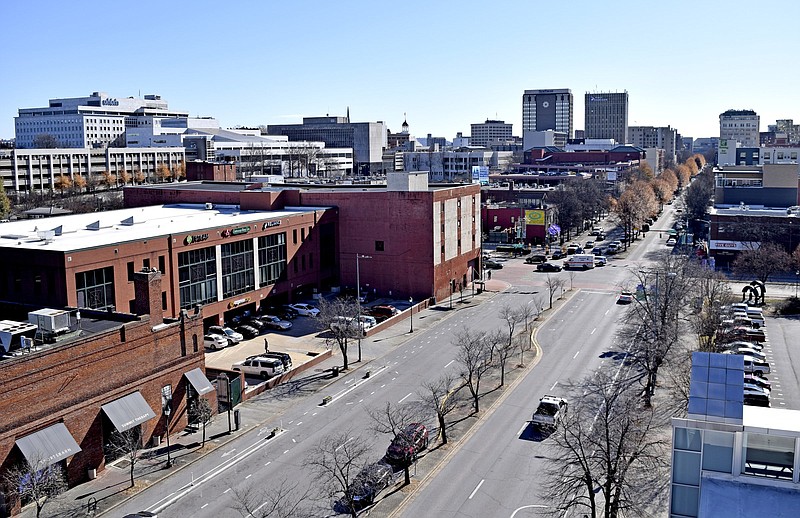Over the past four decades as Chattanooga has revitalized its riverfront and downtown, the Scenic City of the South has grown its dining, entertainment, cultural and tourism attractions and going into 2020 was expected to be one of the top mid-size markets for hiring more workers.
But the business shutdowns ordered to limit the spread of the coronavirus and the consumer fears bred by the COVID-19 virus have quickly sickened the outlook for the local economy.
While the city's transformation has helped draw millions of visitors and billions of dollars of new investment, Chattanooga is now among the most economically sensitive metropolitan areas in America for the coronavirus, according to new studies by a pair of online personal finance websites.
MoneyGeek predicts unemployment in metro Chattanooga will rise to 29% with 80,000 persons losing their jobs - more than triple the job losses during the Great Recession of 2008-2009 when 26,455 Chattanoogans were unemployed.
"This downturn has such historically high numbers because so much of the service industry is being shut down or affected by the coronavirus," said Hillary Adler, director of content marketing for MoneyGeek.
Nationwide, MoneyGeek expects the jobless rate to top out at 25-27%. But it will be even higher in Chattanooga because of the greater dependence upon retail, service and travel-related jobs hurt the worst by the COVID-19 virus and its aftermath.
Projected jobless rates
* Memphis - 32% with 205,400 unemployed* Chattanooga - 29% with 80,000 unemployed* Nashville - 28% with 311,700 unemployed* Cleveland - 24% with 14,800 unemployedSource: MoneyGeek
Another personal finance website, Lendingtree. com, ranked the nation's 100 biggest metro areas and put Chattanooga as the fourth most vulnerable to coronavirus business closings because of its higher share of local businesses in the retail, food and entertainment sectors.
Among the 11,489 businesses in the 6-county Chattanooga metro area area, 28.3% are in the retail, food, hotel or arts and entertainment sectors which have largely been shutdown to control the spread of COVID-19.
Nearly all of Chattanooga's biggest tourist attractions which help fuel the local $1.1 billion-a-year market for visitors and convention goers are now shut down due to the COVID-19 crisis.
According to the 2017 Economic Census Report, metro Chattanooga had 1,174 businesses in the accommodation and food services, 1,901 retail establishments, and 175 businesses in arts, entertainment and recreation.
"The coronavirus pandemic has crashed the U.S. economy and brought certain industries to a near standstill - including retail, entertainment, food and accommodations," Melissa Wylie of LendingTree aid. "Cities that have traditionally relied on these sectors to employ their citizens may be particularly vulnerable."
At the end of 2019, a year-end survey of employers by the Manpower staffing agency ranked Chattanooga as one of the top mid-sized markets for hiring activity planned in 202o. But three months later, many of those employers shut down due to the coronavirus and many are now cutting staff and idling workers.
Cities most vulnerable to virus
The cities with the highest share of all local businesses in vulnerable businesses to the coronavirus in retail, accommodation and food services, and entertainment, including arts and recreation are:1. Myrtle Beach, South Carolina, 35.4%2. Salisbury, Maryland, 32.3%3. Scranton, Pennsylvania, 28.8%4. Chattanooga, 28.3%5. McAllen, Texas, 27.8%6. New Orleans, 27.7%7 .El Paso, Texas, 27.7%8. Memphis, 27.5%9. Bakersfield, California, 27.5%10. Youngstown, Ohio, 27.5%Source: Lendingtree study of the top 100 U.S. metro areas. Data comes from the Census Bureau’s Business Patterns and compiled for 2017 business activity. Metro Chattanooga includes Hamilton, Marion and Sequatchie counties in Tennessee and Catoosa, Dade and Walker counties in Georgia.
The Tennessee Department of Labor and Workforce Development reported last week that 33,329 people in the 10-county Chattanooga region of Southeast Tennessee filed initial claims for unemployment in the previous month since local and state officials shut down most non-essential businesses in mid March. The layoffs have affected 11.8% of workers who were employed in those counties during February and more layoffs are expected this month.
Tennessee and Georgia are among the earliest states to relax some of the stay-at-home orders that have closed stores, restaurants, spas and many service industry businesses. But consumer concerns over visiting such businesses or traveling to other cities before a vaccine is developed for the COVID-19 virus could still keep many shoppers and visitors away from such businesses.
The economic impact of the record surge in jobless claims is being mitigated by the biggest economic relief effort in U.S. history, which is aiding both businesses with low-interest and forgivable Small Business Administration loans and the most generous jobless benefits ever paid for unemployed claimants. The rules for who is covered by the unemployment insurance program also have been changed to cover more persons whose jobs are cut by the COVID-19 crisis.
Unemployment benefits, which typically make up about 45% of what workers were paid while still on their former jobs, have been raised with a $600 weekly supplemental payment from the federal government. Many unemployed persons will make more in jobless benefits than they did on the job with jobless benefits in Tennessee temporarily rising to anywhere frm $630 to $875 a week.
As a result, the economy could be poised for a rebound once fears over the coronavirus are eased and the economy is reopened. But the economic damage caused by such widespread cutbacks by business - and lingering fears over travel, entertainment and sporting events, among other activities - is likely to linger into the fall and winter months ahead, Adler said.
Nearly all metro areas are being hit by the coronavirus cutbacks. But Lendingtree.cm said the least vulnerable metro area in the country for the virus was Salt Lake City, Utah.
Contact Dave Flessner at dflessner@timesfreepress.com or at 423-757-6340.
